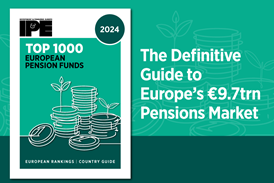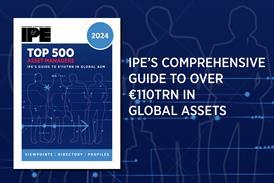Latest analysis – Page 14
-
 Features
FeaturesPerspective: APG & E Fund in China
APG’s partnership with E Fund Management has produced tangible results
-
 Analysis
AnalysisAnalysis: EC gets to issuer side of sustainable finance measures
Major corporate sustainability reporting proposal delivered alongside final draft climate taxonomy criteria
-
 Analysis
AnalysisAnalysis: Pension funds embark on SFDR implementation journey
IPE analysis across four key EU pension jurisdictions finds uncertainty about the final detailed rules underpinning the anti-greenwashing regulation
-
 Features
FeaturesSustainability: A purpose-driven stock exchange
The UN Sustainable Development Goals (SDGs) have caught the imagination of the investment world. For many in the millennial generation the idea that its investments should fulfil positive social or environmental impacts seems self-evident. Yet many asset managers still struggle to incorporate SDGs into their strategies. Nor do they hesitate to trumpet questionable ESG credentials to investors.
-
 Features
FeaturesDB accounting: Lump-sum benefits
Service-defined lump-sum payments are causing accounting attribution problems
-
 Features
FeaturesPerspective: UK actuaries and COVID-19 – Exceeding expectations
COVID-19 has brought few positive outcomes but the response from UK actuaries could become a template for bringing other strategic challenges to the fore
-
 Features
FeaturesFX Reserves: The ‘rainy day’ has arrived
The world is facing a short-term health and economic crisis with COVID-19. In the longer term it is threatened by an existential crisis with global warming caused by burning fossil fuels.
-
 Features
FeaturesPerspective: Pooled investors gain a vote
A disruptive new service allows institutional investors in pooled funds to express their stewardship preferences. Will others follow suit?
-
 Opinion Pieces
Opinion PiecesThe world is approaching an inflection point
Domestic challenges and US political developments have proved such a preoccupation recently that it has been all too easy to miss a key global shift. China’s rise to global prominence has accelerated markedly as a result of the past year’s events.
-
 Opinion Pieces
Opinion PiecesCOVID-19 barely tested the financial system
The financial system seems to have coped well with COVID-19. This is despite the repeated recent warnings about a build-up of systemic risk. In turn this has been linked to the abundance of cheap debt and the growth of the asset management industry.
-
 Opinion Pieces
Opinion Pieces‘Close contact’ needed amid pandemic
Multiple lockdown restrictions have brought about a simpler way of working for some – remotely from home for most – but for institutional investors it also meant coming up with strategic models that could maintain the quality of asset managers’ due diligence – existing or potential.
-
 Features
FeaturesPerspective: Targeting net zero
Ambitious ‘net-zero’ carbon reduction goals are the latest in the evolution of asset owners’ engagement with climate change
-
 Features
FeaturesThe pandemic end-game
Overcoming COVID-19 and ensuring no recurrence is proving to be a formidable challenge for the global economy. The worst may still lie ahead. Even health systems in developed markets are creaking at the seams with the second and third waves of the pandemic. More transmissible mutations of the virus are making the task even harder.
-
Features
Accounting Matters: Auditing the auditors
There is widespread consensus that the audit sector is not fulfilling its potential, and that previous attempts at reform have been ineffective. As the impact of high quality audit goes far beyond the boardroom, when pension funds rely on audited financial statements for their capital allocation decisions, it is ultimately their individual members’ capital that is at risk.
-
 Features
FeaturesLong-term matters: Stop investing in autocracy
Europeans observing the US ‘near miss’ constitutional crisis have a choice – be spectators or show responsibility
-
 Features
FeaturesBiodiversity can be measured
Last year was clearly the year of the pandemic. Perhaps the connection between zoonotic disease and biodiversity loss may explain why it has also been the year that biodiversity has become a theme of great interest for investors. Yet current environmental, social and governance (ESG) data and metrics do not cover biodiversity adequately.
-
 Features
FeaturesPerspective: Litigation - state of pay?
Changes in legislation like the UK’s Consumer Rights Act 2015 have led to an increase of class actions led by pension funds as they seek to recover investment losses
-
 Features
FeaturesResearch: The shift from virtue to value
In the final article in a series of two, Pascal Blanqué and Amin Rajan argue that the success of ESG investing rests on a just transition to a low carbon future
-
 Features
FeaturesIs sustainability mispriced?
Living in the developed world over the past 50 years, life has been stable, even idyllic, for most people. That is certainly compared with their grandparents and previous generations who lived through two world wars and the Spanish flu. But, as COVID-19 has shown so cruelly, there are existential dangers that can lie hidden. These can rip the established world order asunder if not tackled beforehand.
-
 Features
FeaturesAccounting Matters: Accounting for the Wedge
The reason why defined benefit (DB) scheme sponsors account for inflation is because International Accounting Standard 19, Employee Benefits, tells them that if they make a benefit promise that is linked to price increases, the effect of that commitment has to be accounted for. The starting point for what by any standards is a gargantuan actuarial task is to look at yields on inflation-linked bonds.





